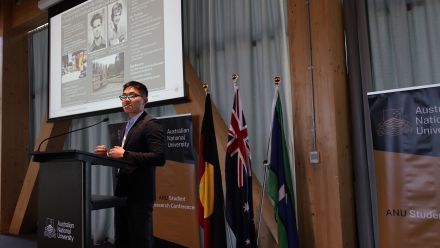A new dimension in cancer research
While there have been improvements in the survival rate for many cancers over the last 20 years, unfortunately, for many cancers, patient outcomes are still poor. New advancements in technology, however, are raising new hope for cancer research.
Using 3D printing technology, Dr Amee George, Manager of the , hopes to change the availability of physiologically relevant tumour models for researchers in Canberra.
Traditional methods for cancer drug discovery utilise 2D cell culture models, which in many instances do not faithfully recapitulate the complex nature and organisation of some tumour types.
Dr George, Research Fellow within the .
"This can slow the rate of drug discovery for some of the hard-to-treat tumours."
The recently installed RASTRUM 3D cellular bio-printer aims to solve the problem of researching cancer in 2D - by enabling 3D printing of cancer cells, which are allowed to form 'mini tumours'.
"We can treat these 'mini tumours' with different drugs or drug combinations to determine whether we can prevent the tumour from growing. Or kill off the tumour entirely."
"We can image using sophisticated microscopy techniques and quantify these changes using computational analysis," says Dr George.
Other cell types can also be added into the printing process, including immune cells or supporting cells. This can help determine what effect treatments have on the tumour or the other cells within that environment.
The 3D printing process can be applied to all sorts of cells and tumour types.
Professor Leonie Quinn, leader of the Quinn Group of Cancer Models in JCSMR, is currently using the 3D technology to study brain tumours.
"This technology will enable generation of 3D brain organoids - 'mini brains' - to identify the more suitable drug candidates, which we will fast-track to pre-clinical and clinical testing to improve brain cancer patient outcomes" said Dr Quinn.
Cutting-edge technology like the RASTRUM 3D cellular bio-printer helps our leading researchers break new ground in cancer therapies. By supporting the Cancer Research Endowment, you are supporting our cancer researchers in their areas of greatest need - including the availability of newer research equipment.
Thank you for your support. You are helping raise new hope for cancer treatments.
This impact story is a feature in the 2020 Report to Donors


